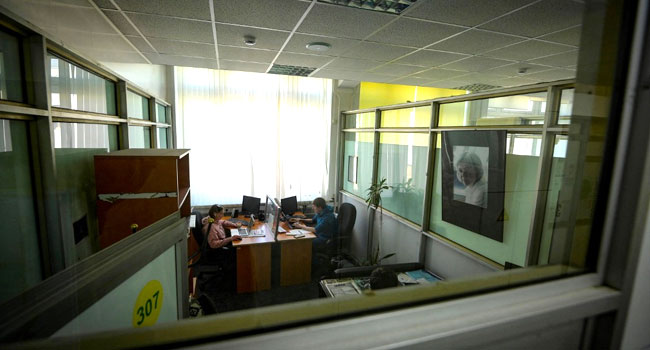
The UK on Thursday announced new sanctions against Russian “propagandists”, including a well-known television presenter, and two Kremlin-funded media operations accused of spreading “lies and deceit” about the invasion of Ukraine.
The 14 latest sanctions follow several previous rounds of penalties against more than 1,000 Russian and Belarusian individuals and entities in response to Moscow’s war in its western neighbour.
“Britain has helped lead the world in exposing Kremlin disinformation, and this latest batch of sanctions hits the shameless propagandists who push out (Vladimir) Putin’s fake news and narratives,” Foreign Secretary Liz Truss said in a statement.
“We will keep on going with more sanctions to ramp up the pressure on Russia and ensure Putin loses in Ukraine. Nothing and no one is off the table.”
Prime Minister Boris Johnson’s official spokesman told reporters separately: “Countries can adapt to sanctions over time so it’s right that we continue to move forward on this.
“It is equally right to impose sanctions on those who are seeking to disinform people at a mass scale.”
READ ALSO: China Sanctions US Officials Who ‘Concocted Lies’ On Human Rights
London targeted Russian Colonel-General Mikhail Mizintsev, head of the Russian National Defence Control Centre, who the UK foreign ministry said had become known as “the butcher of Mariupol” over Russia’s actions in the besieged Ukrainian city.
Johnson’s spokesman said “on the face of it there does appear to be evidence of war crimes” in Mariupol.
TV-Novosti, which owns the global television channel RT — formerly Russia Today — was also sanctioned, as was Rossiya Segodnya, which controls the news agency Sputnik.
The UK broadcasting regulator Ofcom earlier this month revoked RT’s licence with immediate effect, saying it was not “fit and proper” to broadcast in the country.
In reaction, Margarita Simonyan, editor-in-chief of RT told RIA Novosti state news agency, said: “We’ll add this insult to the total count.”
– ‘Propagandist’ –
Meanwhile, the UK also included Sergey Brilyov — a famous TV anchor in Russia on state-owned media outlet Rossiya, known for his interviews with high profile political figures — to its sanctions list, describing him as a “propagandist for Putin”.
“Having previously lived in the UK, (he) will no longer be able to access any of his UK assets or continue business dealings,” the ministry said.
Alexander Zharov, chief executive officer of Gazprom-Media, Alexei Nikolov, the managing director of RT, and Anton Anisimov, head of Sputnik International Broadcasting, were also targeted.
“These sanctions will ensure RT will not be able to find its way back on UK televisions, and will prevent companies and individuals operating in the UK from doing business with Russian state propaganda vehicles,” the foreign ministry added.
London said it had also fast-tracked sanctions against another seven individuals connected to “the Strategic Culture Foundation,” which it described as an online journal registered in Russia.
The ministry noted they were recently sanctioned by Australia for their role in spreading disinformation.
“The UK is operating closely with allies to target Russia’s oligarchs, banks and businesses,” it added.
AFP

